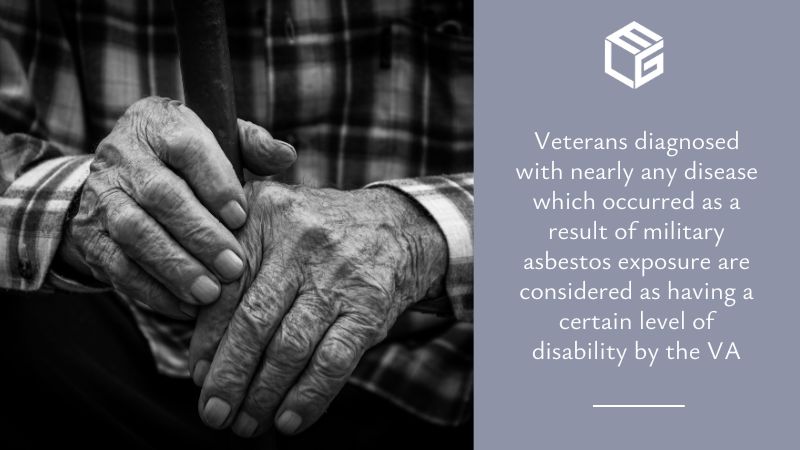We will prove the correlation between the disease and asbestos exposure
The U.S. Department of Veterans Affairs recognizes cancer resulting from military asbestos exposure as a form of disability, which may affect veterans who served during the last century. If a veteran suffers from multiple diseases as a consequence of asbestos exposure, they can request financial compensation for each. For instance, the co-occurrence of lung cancer with colorectal cancer, which is not uncommon among victims of asbestos exposure, grants veterans the right to apply for VA disability compensation twice.
Veterans can also file for asbestos trust funds compensation in addition to their VA claims. Prolonged exposure to asbestos products can lead to various illnesses and in order to file a claim, you must be suffering from a 'diagnosed condition'. VA claims often get denied because of insufficient proof of a correlation between your condition and exposure to toxic asbestos fibers during service. We help veterans with their asbestos trust fund claims and our findings may play a role in the VA disability claim that veterans may also get. One of the following asbestos-related diseases makes a veteran eligible to file a VA disability compensation claim:
Misdiagnosis is quite common among asbestos-exposed individuals as the symptoms of asbestos-related lung diseases are almost similar to other lung disorders. Tuberculosis is one such respiratory disease that mimics the clinical as well as radiographic features of most asbestos-related lung diseases. Therefore, differentiating between tuberculosis and asbestos-related lung cancer is challenging even for medical experts.
Other conditions that mimic asbestos-related lung cancer include:
- chronic bronchitis
- emphysema
- pneumonia
- asthma
Due to the similarity of signs and symptoms, serious illnesses such as pleural mesothelioma and lung cancer in the initial stages is likely to be misdiagnosed as pneumonia or asthma. This is an unfavorable situation and veterans will not be able to qualify for a claim with these diagnoses. For this reason, we encourage seeking a second opinion from a specialist in asbestos-related diseases after a diagnosis is made by the primary care physician.
In order to claim VA disability benefits, on behalf of the veterans we will provide solid evidence regarding the actual exposure to asbestos that occurred while in service. For instance, there should be proof of direct contact with asbestos products such as being a plumber and not just being on the ship. It is worthy of note that veterans who suffer from mesothelioma are not required any additional evidence to support the connection between their illness and exposure since the only cause of this disease is asbestos exposure. As for the other diseases, veterans will have to send our legal team their military records, which they must retrieve, and their medical records if they want to file a claim.
Can veterans work if they receive VA disability benefits?
In general, veterans with a disability rating can still work, but – as is always the case – there are certain exceptions. While veterans who have a low to mild disability rating may continue working, those with a higher disability rating cannot, since they are seen as unemployable. Therefore, if you are a veteran whose disability has been estimated to be 100% under the Individual Unemployability rating, you are not legally allowed to have "substantially gainful employment", according to the Code of Federal Regulations.
If, however, you received a 100% scheduler rating, either as a combined percentage or as the result of a single diagnosis, your eligibility for employment will not be affected at all. Consequently, you can choose to work as much or as little as you wish, as this rating does not measure your ability to hold down a job.
Can I still serve in the U.S. military while receiving VA disability benefits?
As long as you can obtain medical clearance, you may continue your military service despite having a disability. The only factors on which your serving in the military depends are how severe your diagnosis is and the extent to which your illness prevents you from performing your job. Nevertheless, you should bear in mind that you cannot receive military pay and disability benefits simultaneously.
Were you subjected to asbestos exposure while serving in the military? Considering how prevalent asbestos was between 1935 and 1975, veterans who were on active duty have inevitably been in contact with it on at least one occasion. While not everyone who was exposed to asbestos will develop a related disease, the risk is very high for U.S. veterans, particularly for those in the Navy, since they would spend a lot of time surrounded by asbestos dust. Unfortunately, toxic fibers remain in the lungs forever after inhalation, posing a constant threat to your health.
